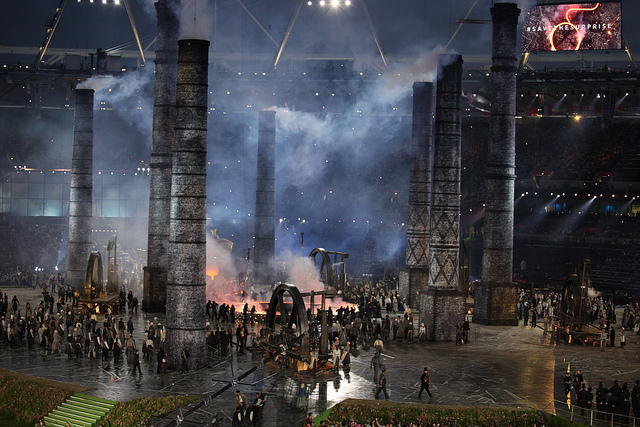 The last two weeks have allowed the nation to celebrate the success of its capital in welcoming the world to London. Don Flynn argues that a big part of the reason why it could do this was because the world was already there.
The last two weeks have allowed the nation to celebrate the success of its capital in welcoming the world to London. Don Flynn argues that a big part of the reason why it could do this was because the world was already there.
Two thoughts occur to me about the Olympic experience we’ve all just gone through over the past few weeks – which will be extended for another period as we get the chance to celebrate the Paralympics. The first comes from the memory of Danny Boyle’s opening night ceremony, with its barely disguised theme of a Peoples’ History of Great Britain.

It offered a narrative of an old nation which had become new through the rise of ordinary citizens, working together to transform old institutions and build up new ones which nurtured and sustained the idea of a country which was capable of delivering ‘fare shares for all’.
In recent years political ideologues of various hues have reflected on the social movements which brought this about and have decided that they are essentially conservative in character, representing a supposedly timeless instinct on the part of human beings to support the welfare of others, providing the they bore all the hallmarks of being ‘one of us’.
This is a view that predicts the impossibility of welfare states in societies where too many people are strangers who cannot be trusted to relate to each other on the basis of the age-old principles sustained by the extended kinship group. Once the neighbourhood rises beyond a certain freshhold in the numbers of people with a different skin tone, or accents that suggest other climes, then trust breaks down and the possibility of a compassionate concern to each other’s welfare flies out the window.
Boyle’s imaginative tableaux did not encourage such conclusions. Whilst some have criticised it for not including Britain’s colonial role in its vision, it nevertheless did enough to suggest that black, brown and people with foreign accents were involved in all the heroic movements which modernised and fashioned our modern welfare society. In any image of this sort, the NHS is bound to have pride of place, and the bouncing beds and dancing nurses and doctors recalled this for the benefit of the mood of international fellowship, which is supposed to be a part of the Olympian spirit.
The second thought comes from the city which has formed the backdrop to these two weeks of friendly competition – London itself. Political conservatives – as likely to be found in the ranks of Labour as they are in the official Conservative party – have made common cause in decrying the thing that London has become over the past half century, as a monstrous Babel in which only rootless cosmopolitans can feel at home.
Its vastness and diversity is contrasted with the intimacy of towns and cities in other parts of Britain. It has been demonised as a constant danger to the integrity of what remains of ‘British life’, operating as it does with the avid consuming desire to expand the global economy on which its existence depends on every other nation and region of the Isles.
What they hint at is the nature of London as a city of immigration, and what they so often deplore is not its failure, but its success in building communities in which people engage and renew their sense of commitment and obligation towards one another.
Yes, a lot of the time this takes place only because people move across a rocky road which involves setbacks as much as it leads to success. Naysayers have their stock of bad news to draw on which helps them make their case that immigration isn’t working. These are messages which are taken up with eagerness in the headlines of some newspapers, and with scarcely less enthusiasm by politicians who are looking for ways to obtain some rapport with a mass public opinion which so often reviles and spurns them.
But this last fortnight of a memorable Olympic Games has given us the opportunity to reflect in the bigger canvas, on what type of entity is emerging in the capital city, and it sustains to a far greater extent the sense of a positive direction for modern society, which its considerable capacity to forge bonds of trust and community out of the global contexts in which it does its work.
The legacy question is, how do we build on these weeks of showing the world what a global community in one city can look like? Will we find voices in other parts of the UK which are prepared to resist the doomsters who predict only disaster coming from internationalism, and who can map out perspectives for their cities and regions which are also about greater involvement in the wider world?
Most of all, will the leaderships of all the political parties in Britain rise to the challenge and stop talking about immigration as a mistake that should not have been allowed to happen? If the voices in Parliament and in Whitehall’s corridors of power prepared to speak out on this issue become more numerous and more confident in their arguments, then that might prove to be the very best legacy we can hope for from the London Games 2012.
This article first appeared on the Migrants’ Rights Network website.
Note: This article gives the views of the author, and not the position of the British Politics and Policy blog, nor of the London School of Economics. Please read our comments policy before posting.
Don Flynn is the MRN Director, leads the organisation’s strategic development and coordinates MRN’s policy and project work






“Most of all, will the leaderships of all the political parties in Britain rise to the challenge and stop talking about immigration as a mistake that should not have been allowed to happen?” – What makes you think it’s the politicians that are discussing this? It’s us, the displaced, those who feel as though we are strangers in our own country that are openly talking about it. Many of us, ethnically cleansed and driven from our homes in East London and other cities where our families have lived and worked for generations. We are the ones that have been forgotten. Immigration is fine if it’s controlled. It has not and is still not being controlled. It’s a shambles and has brought England to it’s knees and alienated the indigenous population. So stick that in your leftie, progressive pipe and smoke it.